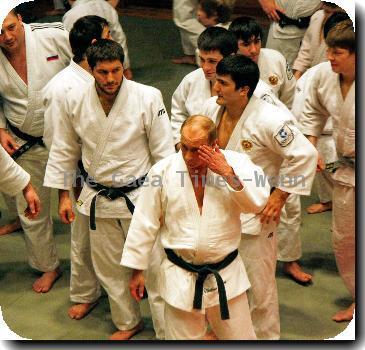Russian military moves ammunition to safety as wildfires continue
By Jim Heintz, APThursday, August 5, 2010
Russia moves ammunition as wildfires spread
MOSCOW — A Russian military garrison near Moscow moved all its rockets and artillery to a safer location as wildfires advanced in the region, the government said Thursday.
Col. Alexei Kuznetsov, a Defense Ministry spokesman, told The Associated Press that the garrison near Naro-Fominsk, 70 kilometers (45 miles) southwest of Moscow, was not in immediate danger. But the decision to move the explosive materiel underlined the challenges posed by the hundreds of fires raging in Russia after weeks of intense heat and drought.
A wildfire leapt into a Russian naval air base outside Moscow last week, causing substantial damage; Russian media reported as many as 200 planes may have been destroyed.
Almost 600 fires, mostly in western Russia, were reported burning on Thursday. The death toll from the fires stands at 50.
Earlier, a shelter with some 1,800 animals near Moscow reported that it had been threatened by fires and that one had approached within 150 meters (yards) before being extinguished. But shelter director Daria Taraskina said late Thursday that there were no blazes nearby, though concern remained high for the dogs, cats and retired circus animals at the facility in Khoteichi, 40 miles (64 kilometers) east of Moscow.
Thick smog that had blanketed Moscow partially lifted early Thursday but could return with no end in sight to a record heat wave, officials warned.
Temperatures up to 100 F (38 C) have exacerbated forest and peat bog fires across Russia’s central and western regions, destroying close to 2,000 homes. Officials have suggested the 10,000 firefighters battling the blazes aren’t enough. The forecast for the week ahead shows little change in the capital and surrounding regions, where the average summer temperature is around 23 (75).
In the blaze-ravaged village of Plotava, some 35 miles (60 kilometers) east of Moscow, local official Viktor Sorokin lamented that the number of fire wardens in woodland and peat bog areas had halved to 150 in the last few years under new rules.
“There used to be more of them, now there aren’t enough,” he said.
Some locals are taking the initiative to make up the shortfall in firefighters.
“We woke up several days ago and we couldn’t breathe,” said Alexander Babayev, a 27-year-old owner of a drive-in theater, before taking a hose to low rising flames flickering above the smoldering ground.
Babayev assembled a motley team of volunteers using a social networking website and, after a few instructions from professionals, they began tending to fires.
Prime Minister Vladimir Putin has promised to build new, better homes before winter, and vowed each victim would receive $6,600 in compensation. The sum is huge in a country whose average monthly wage is around $800, and Russian media say some residents may have deliberately torched their dwellings to qualify.
To the east, firefighters focused on beating flames back from a top-secret nuclear research facility in the city of Sarov. A Sarov news website on Thursday cited local officials as saying a wall of fire had been broken down into several smaller blazes. On Wednesday, officials said the closest blaze was still several miles (kilometers) from the main facilities at the Russian Federal Nuclear Research Center and as a precaution all hazardous materials had been evacuated.
In the capital, President Dmitry Medvedev fired several high-ranking military officials Wednesday over what he called criminal negligence in fires that ravaged a military base.
Russia has been sent helicopters and planes to help douse the flames from Ukraine, Armenia, Italy, Kazakhstan, Azerbaijan, Emergencies Minister Sergei Shoigu said in televised comments.
_____
Associated Press writers Mansur Mirovalev, Khristina Narizhnaya and David Nowak contributed to this report.
Tags: Animals, Eastern Europe, Europe, Fires, Military Facilities, Moscow, Nuclear Science, Physics, Russia, Vladimir Putin

